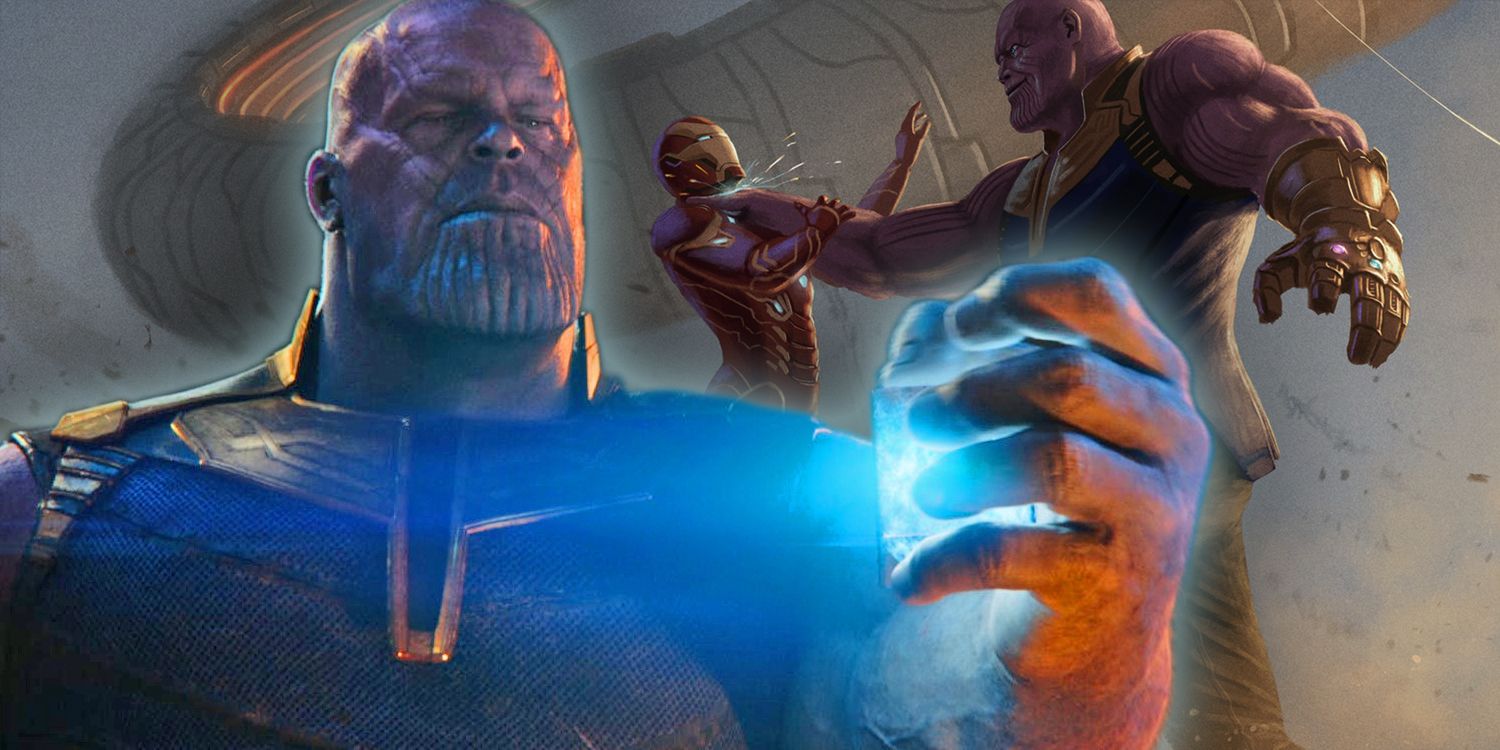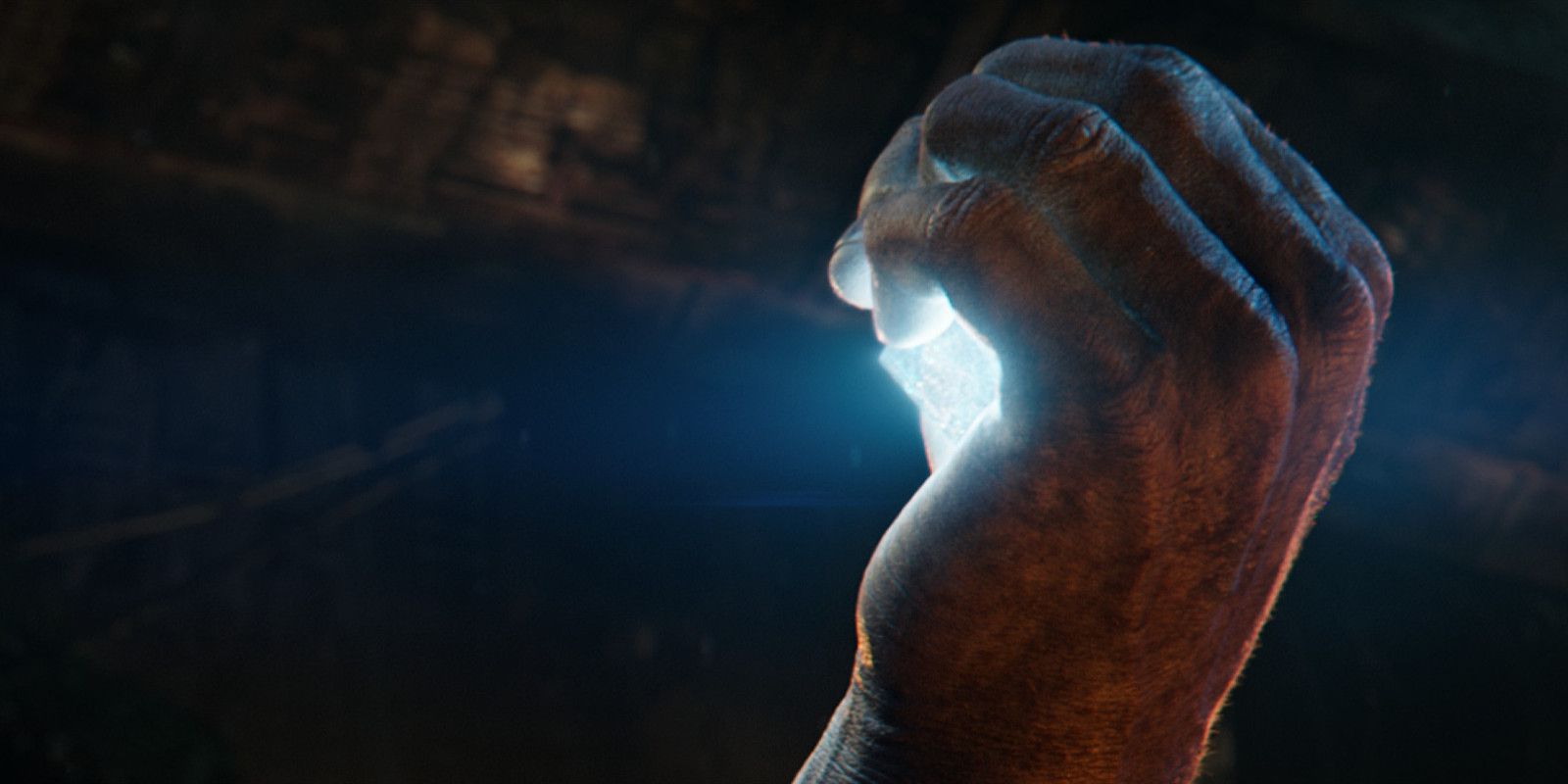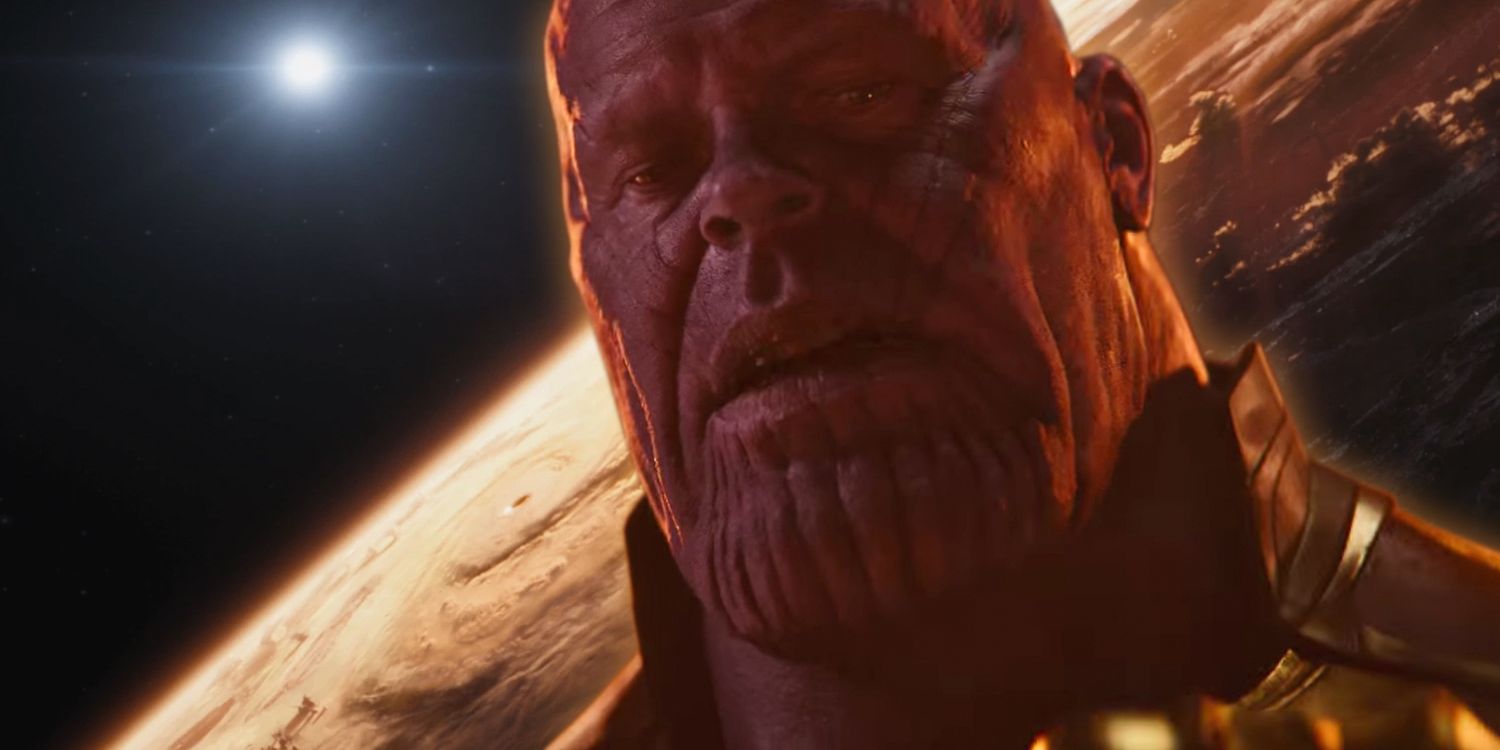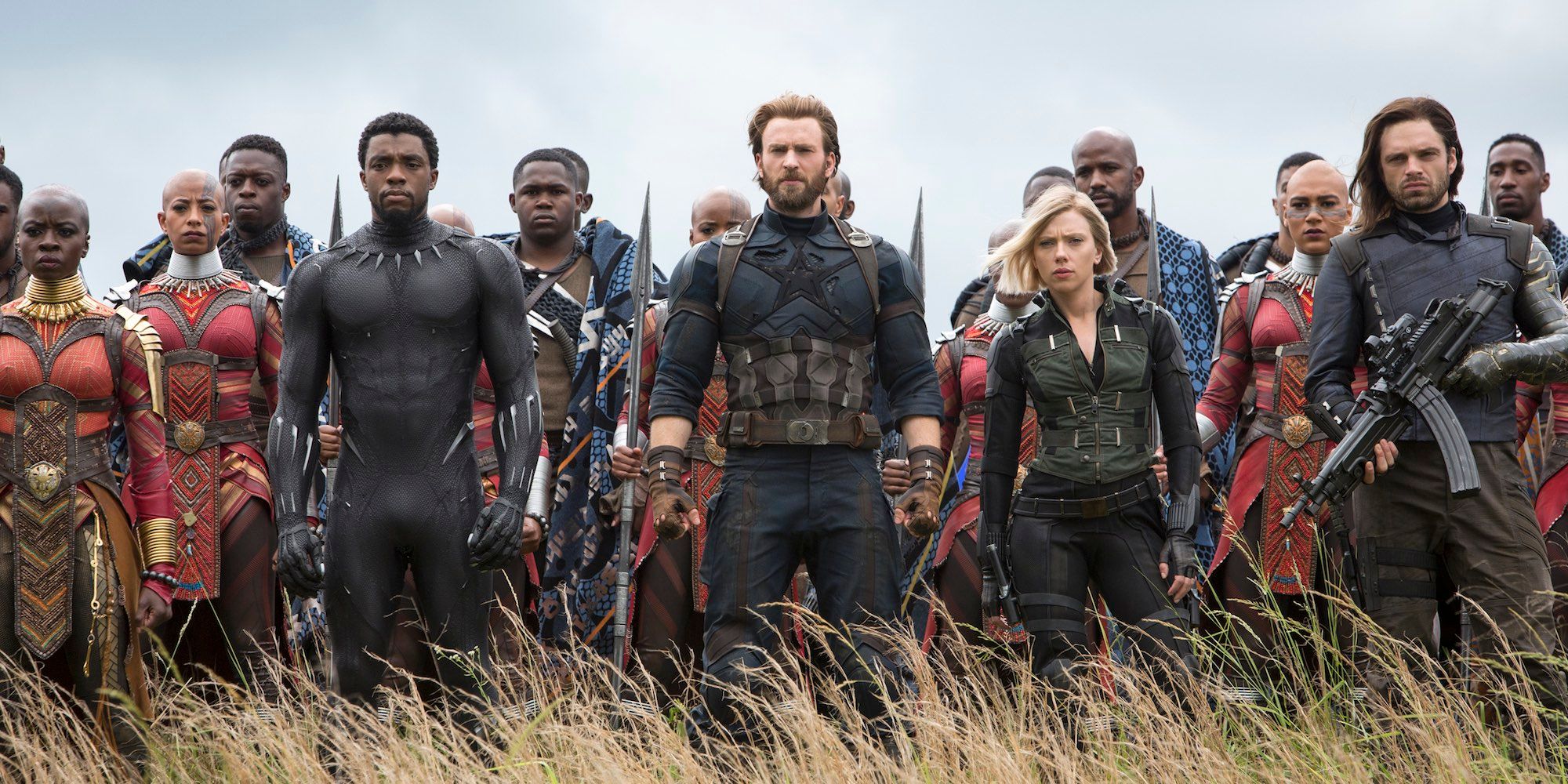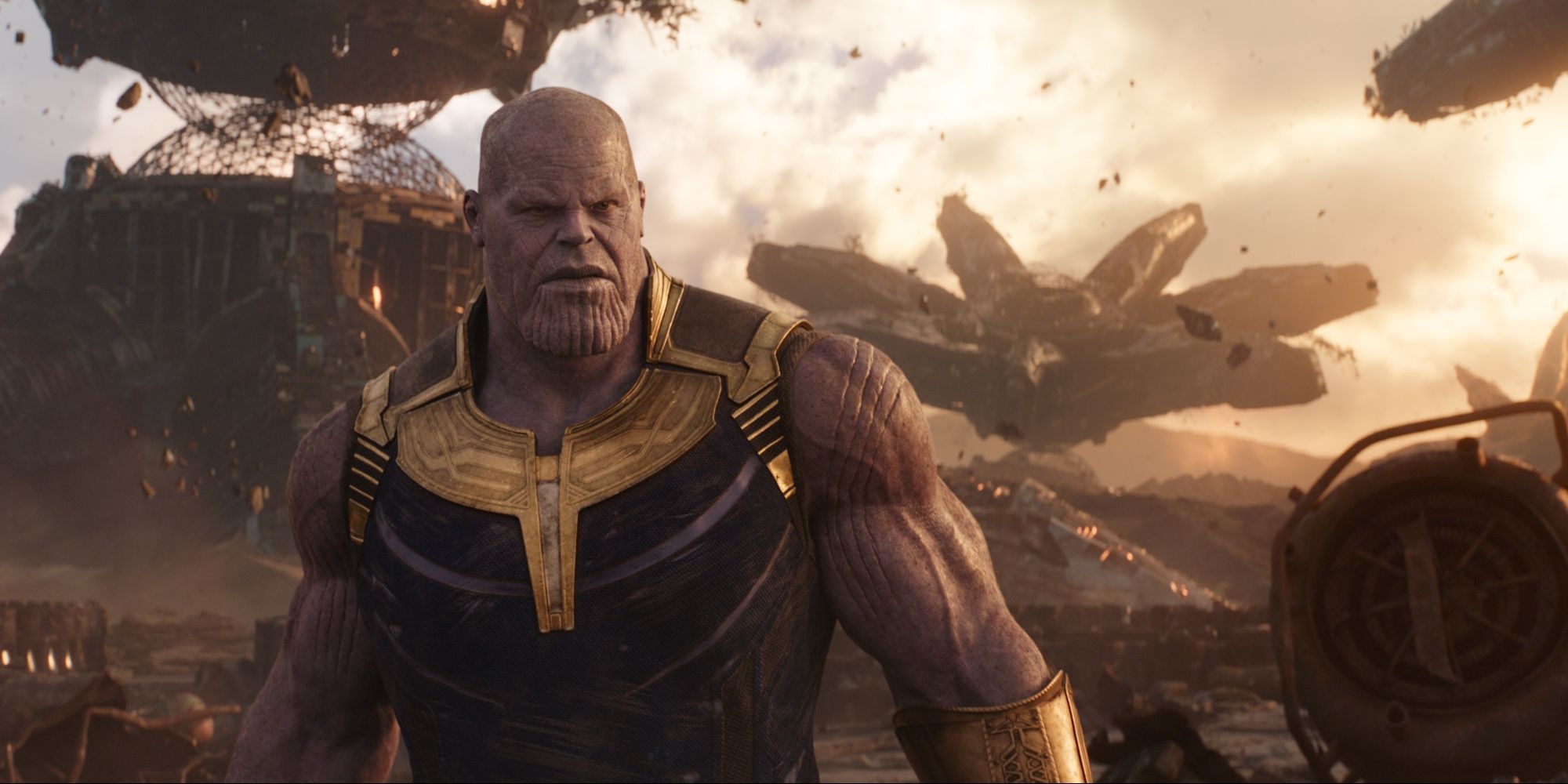Avengers: Infinity War is ostensibly about Thanos collecting the Infinity Stones, but his deadly mission is more than a simple fetch quest. As promised by the filmmakers, the acquiring of each Infinity Stone requires some form of sacrifice. However, the loss goes two ways.
The sacrifice on the Avengers' side should be pretty obvious. Loki and Heimdall die in the first ten minutes, setting the scene for two-and-a-half hours where all the key heroes are forced to challenge their long-held beliefs. And that's nothing on the ending, when half the Avengers vanish from reality, leaving the original icons forced the face defeat. Captain America, the altruistic boy scout, even blasphemes, exclaiming "Oh God" as he takes in the horror of what Thanos has done.
Related: Avengers: Infinity War's Ending Explained
But that isn't the real sacrifice at the heart of Avengers: Infinity War. What the heroes go through is certainly life-changing by all measures, but this is a movie ultimately about Thanos. He's been described as the main character since the start of production, and with the released film that centering is only more prominent. Indeed, it's with that angling that what the Infinity Stones really represent comes out.
- This Page: What The Infinity Stones Represent
What Actually Is The "Cost" of the Infinity Stones?
Screenwriter Stephen McFreely told us on the set of Avengers: Infinity War that someone pays when each Infinity Stone is taken - there's a "cost for literal characters" - and in the movie that really is a story necessity: without some sense of payment, they really are just magical MacGuffins. Given we're dealing with in an Avengers film, the assumption this applies to the heroes: Xandar was destroyed for the Power Stone, Loki killed for the Space Stone, Collector Reality, Gamora the Soul, and Vision for the Mind, with the Time Stone sacrifice being either Doctor Strange breaking his oath (albeit for a greater purpose) or the moment where defeat is unavoidable. The main thread here is that the characters are unprepared in some form and pay a harsh price.
In that reading, the only negative impact on Thanos is with the murder of his favorite daughter Gamora, whereas all the others are to his direct benefit. The cost of the Infinity Stones is to those losing them. But is it?
From his opening speech on "destiny arriving all the same", Thanos is presented as a being of pure conviction, driven by such devotion to his goal that he will do anything to achieve it and be at peace. And he does: at the end, when he visits Gamora in Soul World, she asks him what it cost to finally win and wipe out half the universe, to which he responds "everything". Internalized it may be, but the film makes clear he has sacrificed so much of himself on this quest, with his eventual peace - and not the distraught protagonists - getting the final shot. While the Avengers certainly pay, the one who we see feels the toll of the Infinity Stones sum collection is Thanos. He is the one on a mission; all the heroes are trying to do is stop him. And so the focus of all this shifts.
Thanos' Sacrifices For The Infinity Stones
Just as the Infinity Stones each represent a different form of baseline cosmic power (at least in the MCU), so too does each step of Thanos' journey collect them force him to face a key facet of himself and atone for it.
Related: The Origins Of The Infinity Stones Explained
The Power Stone was taken for Xandar, which Thanos sacked a week before the events of Infinity War. This was part of his goal as unseen puppetmaster in Guardians of the Galaxy, with him promising to destroy the planet with the Power Stone once Ronan handed it over. Her, we see an admission of misjudgment: Thanos ends up having to decimate a planet he'd only ever intended to as bartering and does so to get the very thing he was going to use in the attack.
The Space Stone's sacrifice is the death of Loki, which again has wayback-reaching ramifications. Loki was Thanos' emissary in The Avengers, so it's once again a grasping of mistakes in the attribution of responsibility. However, as the murder comes only after Loki's attempted betrayal, it also seems to have Thanos grapple with how this quest will leave him truly alone.
The Reality Stone cost is a bit unclear as we don't see Thanos claim it, but there are a few key variables. For one, he's presumably killed the Collector, a move that sees even more of the ancient beings in the MCU fall (something that may have actually been why the Mad Titan held back for so long), thus seeing him again reflect on his previous plans and take weighty lives. The sequence also sees Thanos put himself on the line - albeit with the security of the Reality Stone - to discover Gamora's feeling's for him.
The Soul Stone speaks for itself. Here's where the past atonement is moved beyond and we see Thanos begin to truly give up aspects of himself. He admits to himself his love for Gamora and must sacrifice her explicitly to attain the most-ethereal of the Infinity Stones: a soul for a Soul.
The Time Stone, on the other hand, is incredibly vague (on purpose). We have Thanos stopping in killing Stark and chasing his goal at the expense of personal victory, both of which are representative sacrifices, although there's obviously more going on here. Doctor Strange hands over the gem, rather than it being taken, so it's possible that in doing so the cost to the villain is lost (we'll come back to that).
The Mind Stone, finally, has Thanos lose the most important thing to him: his own purpose. His entire existence centers on his desire to wipe out half the universe, so to collect all six Infinity Stones is the success and start of his life of "peace" without any goal. That's victory, sure, but it's the final step in Thanos' anti-self-realization arc, sanding himself down to nothing.
Related: Thanos Is The MCU's Best Villain, Hands Down
Each of these is to some degree open to interpretation, and others vaguer than that (but, as a reminder, this is a theory). However, the indication is one of contrast: every time Thanos gains a new Stone he becomes outwardly more powerful while giving up something internal. It's not dissimilar to Voldemort and the Horcruxes in Harry Potter; just as the Dark Lord had to fracture his soul to gain immortality, so too must the Mad Titan give up something of himself to truly balance the universe. And, likewise, it can be expected Thanos will suffer a similar form of defeat.
Avengers: Infinity War Is About The Cost Of Victory
Avengers: Infinity War is the second Disney movie in the past year to be pointedly about failure. However, whereas Star Wars: The Last Jedi was about learning from past mistakes, Infinity War is more concerned with the often insurmountable cost of success. Throughout the film, the Avengers discuss very clearly the respective moral stances that they believe to be necessary for victory, only for it to be flipped in desperation and ultimately rendered useless: Vision has the Mind Stone but Captain America refuses to let him die, so when Scarlet Witch eventually does the deed Thanos is within range; Doctor Strange makes no secret that he'll let Tony Stark and Spider-Man die to protect the Time Stone, yet gives it up to save Iron Man's life (albeit as part of his endgame plan); Star-Lord pulls the trigger on Gamora too late and later lets anger get in the way of his plan; Thor has the one weapon capable of killing Thanos, but can't make the blow without first gloating.
Throughout the movie, heroes realize what must be done too late, and prevaricate over the ethics to the point Thanos can gain the upper hand. They aren't willing to face what victory costs, an affliction that barely grazes the villain. Thanos wins because he knows what must be done, letting his own personal justifications override morality, and isn't afraid to act when he needs to; the Avengers hold each other in extreme regard, but whether it's his daughter, lieutenant or impressive adversary, their foe sees everything as indispensable. The cost of victory is high, and the only person in the movie willing to pay it is Thanos.
However, Avengers: Infinity War isn't a movie about pure will; it doesn't endorse Thanos' conviction. Just as the individual movies explore the flaws in their heroes ethos, Infinity War aims to question drive as a good trait when pushed to these unthinkable extremes. It doesn't provide an overt conclusion, instead letting the horrors of inaction on the heroes side, but the message is still clear: victory cost everything, and while those sacrifices gave Thanos peace, that move breaks a person.
What Do Thanos' Sacrifices Say About His Defeat
So far, we've been focused on extrapolating the suggestion of Thanos' active and symbolic sacrifices to the themes of Avengers: Infinity War, but considering this was only ever Part 1 of 2, it surely says something more. This is a superhero movie, so, ultimately, the Avengers will fight back and they will win. Thus, while Infinity War is presenting a scenario where the route to victory is only by immense cost and compassion is a barrier, the currently-untitled Avengers 4 is surely going to flip that, exploring the ramifications of what Thanos has done on the Mad Titan and how the Avengers innate qualities lead to true long-term triumph.
Related: What We Know About The Plot Of Avengers 4
These sacrifices pave the way. In the comics, one of the key defining traits of Thanos is his tendency for self-motivated defeat. The cosmic being feels unworthy of his god-like power and so subconsciously always seeds a path to his own failure. Like the absence of his infatuation with Lady Death, there's no indication this aspect has been brought over to the MCU, but a similar sense of self-fulfilling defeat may be there. Thanos gives up so much of himself to achieve his goal that when he's won, he's not only robbed of his purpose but the innate drive that got him there. When it comes around to fighting the Avengers again (or stopping their efforts to reverse his mass murder), he's going to be a fallible, broken figure.
The other side of this, one that makes the victorious ending of Infinity War even more ironic, is Doctor Strange's plan. While he did forfeit the Time Stone and with it the Avengers' hope of stopping Thanos, that was clearly not a move made out of defeatism. He was trying to make the 1 in 14,000,605 outcome where they win come to pass. The semantics of the dialogue are wide open, but the talk of "winning" as opposed to "stopping Thanos" is important: Strange recognized the only way to stop Thanos was for him to complete his task, making the sorcerer the one character willing to make a sacrifice - himself and half the universe - out of the hope that it would bring about the ultimate victory.
-
With that in mind, Avengers: Infinity War actually has a lot more in common with the defeatist Star Wars: The Last Jedi than we first allowed credit for. Both films see the heroes pushed and suffer for their inherent flaws, yet nevertheless, end with a glimmer of hope. Victory is still at hand.

